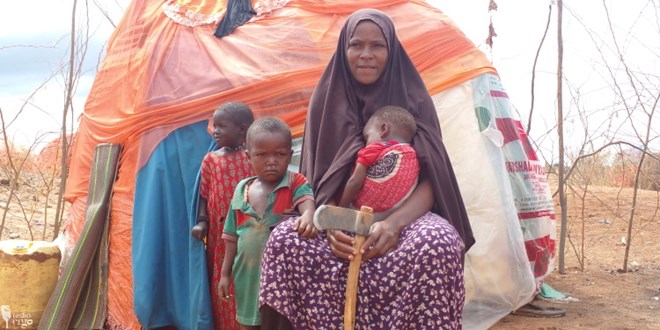
Tuesday May 31, 2022

Fartun Warsame Mohamed, mother who fled from drought in Bakool region, buried two toddlers on her way to Luq/File Photo/Ergo
(ERGO) – A transfer of $60 cash to her phone last month came as a life saver for displaced pastoralist Aniso Abdi Adan, 31, a mother of six, who had sold off her last remaining goat and had no money left to buy what she needed for her children.
She received the cash aid from a World Food Programme (WFP) programme targeting just under 2,000 of the hardest hit pastoralist families in southern Somalia’s Bakool region.
“We had a problem getting water. A drum of water cost $2.1 which was too expensive and we couldn’t afford it. Thanks to the cash we get from WFP we are now able to buy water. In fact, for the last two months we have been living like locals,” Aniso told Radio Ergo, adding that they were managing to eat two meals a day.
Aniso arrived in Elbarde in Bakool last September as the drought intensified. She set up a hut on land allocated by the local authority for the displaced pastoralists fleeing the rural areas. The drought killed 74 of the 78 goats she kept in rural War-garweyne, 17 kilometres from Elbarde town.
She had sold off her last four goats one by one to support her family, eking out the money to keep them all alive. She managed to sell the last goat for $11, leaving her with nothing until the cash arrived.
Rabdhure and Elbarde districts in Bakool region are among the areas hardest hit by the drought and received no rainfall this year. Thousands of pastoralists who lost their livestock are flocking to the towns hoping to receive help.
Local NGO, Action Sustainability and Improvement Programme (ASIP) conducted an assessment of the pastoralists’ circumstances and with the local authorities compiled a list of 2,700 destitute families in Elbarde and Rabdhure desperately needing aid.
Since December, ASIP had been distributing food from WFP to 2,500 families in the two areas, consisting of 25 kgs of rice, flour, sugar and three litres of cooking oil.
According to ASIP food security officer, Osman Abdi Ahmed, the beneficiaries requested cash instead of food aid as they could not buy their other basic needs, but WFP was not able to help everyone.
“We submitted to WFP a list of 2,700 families who economically have been affected by the drought, but WFP said it had no budget for all the people on the list and could only get funds for 1,994 families,” Osman said.
The cash aid of $60 is for a three-month period and June will be the last payment. For some recipients, it has been a drop in their ocean of need.
Mohamed Abdi Bile told Radio Ergo that he had debts of $286 for water for his livestock alone.
“When the drought became too much, I used to fetch water by hiring a motorbike on credit for my 59 goats that I had left in my herd. It cost $22 per round trip and it brought me water 13 times. The owner of the motorbike was by my side when I received the $60 cash and I immediately sent him all the money. But I still owe him the rest of the money!” Mohamed complained.
Mohamed told Radio Ergo that his family’s condition was worsening.
“We only have one meal in the morning and black tea in the evening. We don’t get lunch or supper,” he said.